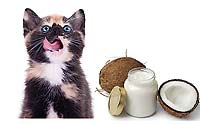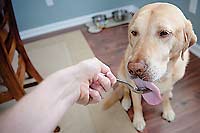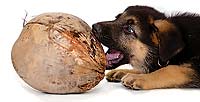We all love to pamper our pets and sometimes they also need a little extra TLC. But did you know there’s an amazing natural ingredient you can use to indulge your dog or cat? You actually may already have it in your kitchen. It’s coconut oil! The health benefits of coconut oil for humans have been well documented. However, not everyone knows about the health benefits of coconut oil for dogs and cats.
Why is Coconut Oil Beneficial for Dogs and Cats?
The main reason why coconut oil is good for humans and pets alike is that it contains healthy saturated fats. Usually, when we hear about saturated fats we start worrying. However, the saturated fats in coconut oil are from medium chain fatty acids MCFA (also called MCT – medium chain triglycerides). Those MFCAs carry a variety of health benefits, just a few of these benefits are:
• It contains antifungal, antibiotic and antiviral properties.
• It helps balance the thyroid.
• It’s great for skin and coat.
• It can help reduce allergic reactions.
• It can disinfect cuts and wounds and soothe
• It helps with digestive disorders.
• It regulates insulin and can help prevent or control diabetes.
• It can repel and expel parasites.
• It can even be used to clean teeth
Practical Uses of Coconut Oil with Dogs & Cats
The practical uses of coconut oil for pets are numerous. There are many conditions and ailments that coconut oil can be used for, and the good news is that you can safely use it both topically and internally. It should be noted that coconut oil comes in many forms. I always recommend using only virgin coconut oil which is 100% organic and is unrefined. It should look like a white mass in the glass jar.
Here are some great ways that you can use coconut oil on your pet:
Coconut Oil for your Dog’s and Cat’s Skin
As I mentioned before, coconut oil contains antibacterial and antifungal properties. You can safely apply coconut oil topically to relieve itchy or dry skin or to soothe fleabites. One thing to remember is that your dog will probably love the taste of coconut oil and could start licking the area. While coconut oil is 100% safe to ingest, your dog won’t get all the great antibacterial benefits from it if licking it off, so try to discourage licking affected areas.
Some dog breeds like bulldogs or pugs have skin folds where irritation and infections can occur. You can use coconut oil to clean and moisturize the folds. This will not only kill any bacteria lurking there, but it will also reduce or eliminate odor. You can use coconut oil to moisturize any dry and cracked paws that your dog may have. So for any kind of skin irritation that your beloved pet may have, rub in a little coconut oil and your pet will love you for it!
Coconut Oil for a Glossy Coat
If you want to give your dog a glossy coat to rival show dogs, then coconut oil is your answer. Many people say that when coconut oil is introduced to their dog’s diet, they notice that the coat becomes glossier and shines. You can also use coconut oil while bathing your dog. Bathe your dog first, then apply coconut oil and massage it deep into the skin. This can help also get rid of any fleas and odors from your dog’s coat. After bathing, you can then apply a thin layer of coconut oil and that can repel fleas and keep allergens away.
Coconut Oil to Fight Bacterial Infections
Coconut oil is high in lauric acid, a fatty acid known for its antimicrobial properties. Applying coconut oil to minor abrasions such as cuts and wounds can help prevent infection. As mentioned before, the oil is edible, so it is safe to use if your dog or cat licks the area where the oil has been applied.
Coconut Oil to Relieve Constipation
If your pet is suffering from constipation then organic extra-virgin coconut oil can work wonders! You should use 1/2 teaspoon of coconut oil for every 10 pounds of body weight. Don’t give your dog too much because then your pet could have the opposite problem – diarrhea! If you notice that the stools are becoming too greasy, reduce the dose or stop it.
Coconut Oil as a Natural Hairball Remedy for Cats.
Coconut oil is a much better hairball remedy for cats than traditional hairball remedies, which usually contain unhealthy mineral oil. You can add a small amount to your cat’s food. But, we all know how picky cats can be with their food. So if that doesn’t work, try dabbing some on your cat’s paw and they will probably lick it off.
Coconut Oil to Improve Gum Health
Gingivitis is inflammation of the gum tissue that can lead to receding gums and coconut oil is one of the natural remedies for gingivitis. Gingivitis is common not just among people, but among cats and dogs as well. Rubbing coconut oil on the gums of your pet daily can help reduce inflammation and pain.
Coconut Oil Dosage for Dogs and Cats
Because there are a lot of calories in coconut oil you should only use it in moderation. It is also a good idea to start with a smaller dose and then gradually increase them. We recommend starting with about 1/8 teaspoon for every 20 pounds of body weight. This can then be increased gradually. The maximum dose should be no more than 1/2 teaspoon per 20 pounds of body weight.
Some people use 1 teaspoon per 10 pounds of body weight daily or about 1 tablespoon per 30 pounds, but don’t start with these amounts at the beginning. Always start from a low quantity and gradually increase the amount. If you notice that your dog or cat starts having diarrhea, then you should lower the dose. If they show any signs of abdominal discomfort or start vomiting, then it is best to stop the coconut oil and consult with a vet.
Just feed coconut oil as a daily supplement by adding it directly to your dog’s meal. But remember coconut oil is a MCFA and your dog still needs other fatty acids in their diet. So if you’re feeding your dog fish oil, hemp oil or other supplements, add the coconut oil to the rotation.
What are the Precautions of using Coconut Oil for Pets?
Generally, coconut oil is very safe for all animals, not just dogs and cats. There are, however, a few things that are good to remember. There are a lot of calories in coconut oil, about 117 per tablespoon. So, you may want to reduce other treats if you regularly give your dog or cat coconut oil. Also, if your pet is on a calorie-controlled diet, remember and count the calories of coconut oil.
Some animals can be allergic to coconuts, and if your pets show signs of an allergic reaction, then stop using coconut oil.
|